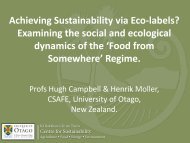Book of Abstract (incl. addendum) - IFSA symposium 2012
Book of Abstract (incl. addendum) - IFSA symposium 2012
Book of Abstract (incl. addendum) - IFSA symposium 2012
Create successful ePaper yourself
Turn your PDF publications into a flip-book with our unique Google optimized e-Paper software.
Workshop 6.3 Organics: their dynamics<br />
The aim should that for each <strong>of</strong> the focus areas only a limited set <strong>of</strong> key indicators (or at least<br />
control points) are outlined, as a result <strong>of</strong> a participatory process. Once this has been introduced a<br />
simplification <strong>of</strong> some <strong>of</strong> the norms is possible.<br />
The challenge is the transition from the old to the new approach without creating additional<br />
burdens for farmers, but to base the whole system more on self-responsibility and monitoring progress.<br />
First experiences with such an approach and recommendations are given how to implement, upscale<br />
and combine different approaches both for regulatory bodies, advisory services and standard setters.<br />
Currently, certification examines in fine detail to check whether boundaries have been<br />
overstepped; in future it could rather determine where this farm is along the path and what can be<br />
optimised.<br />
Exits from organic farming. Dynamics in France and processes at stake at<br />
farm level<br />
Sophie Madelrieux, Françoise Alavoine-Mornas and Robin Gasnier<br />
Irstea, France<br />
Sophie.Madelrieux@cemagref.fr<br />
Most <strong>of</strong> European countries are far from the targets set by many European Governments for organic<br />
farming, and the incentives do not seem sufficient to secure the organic sector in the long run. The<br />
much-vaunted success <strong>of</strong> organic farming (OF) hides more complex dynamics with a growing turnover<br />
<strong>of</strong> organic farmers. But until now, researches as well as public policies have mostly focused on<br />
conversion to OF, and not on the maintenance in OF. Whereas the maintenance <strong>of</strong> OF seems essential<br />
to promote the organic sector. In the present study, we aim at investigating the opting-out phenomenon<br />
in France in two directions. Firstly, we study its extent since we can note a lack <strong>of</strong> such data in<br />
literature and statistics. From data provided by the Agence Bio about the number <strong>of</strong> farmers who left<br />
organic certification between 2005 and 2010, we analyze and provide an overview <strong>of</strong> movements out<br />
<strong>of</strong> OF throughout France. Then, from a case study in the Rhône-Alpes area, we explore the processes<br />
which lead farmers to quit OF certification, and identify the different meanings <strong>of</strong> deregistration in<br />
individual and farm paths regarding organic farming.<br />
Our work show that the opting-out phenomenon is still limited in France, but highlights the<br />
growing part <strong>of</strong> early exits (before or at the end <strong>of</strong> the conversion period), questioning the evolution <strong>of</strong><br />
the phenomenon. Then we point out that there is a diversity <strong>of</strong> decertification processes, as<br />
combinations <strong>of</strong> circumstances, farmers’ and farms’ “journeys” in the framework <strong>of</strong> organic farming,<br />
and what remains at farm’s and farmers’ level from their passage through OF certification.<br />
The value <strong>of</strong> this approach resides in the fact that it improves the intelligibility <strong>of</strong> forms <strong>of</strong><br />
transition by, and practising <strong>of</strong> OF, going further than approaches by motivations and consequences,<br />
enriching the debates about patterns <strong>of</strong> OF, difficulties that farmers have to maintain in OF, and<br />
difficulties <strong>of</strong> the organic sector.<br />
Sustainability assessment <strong>of</strong> stockless organic farming system with agroecological<br />
and socio-economic indicators in Italy<br />
Paola Migliorini, Francesco Galioto, Valentina Moschini, Massimo Chiorri and Concetta Vazzana<br />
University <strong>of</strong> Gastronomic Science, Italy<br />
P.Migliorini@unisg.it<br />
Is organic agriculture sustainable? For which aspects?<br />
These research combine the agroecological with the socio-economic dimension <strong>of</strong> sustainability.<br />
It has been performed in the three years 2006/08, over 12 organic farms located in 6 regions <strong>of</strong> central<br />
and northern Italy To assess agricultural sustainability at farm level the following environmental<br />
subsystems were identified: the physical system (soil and water) and biological (flora and fauna) and<br />
123











